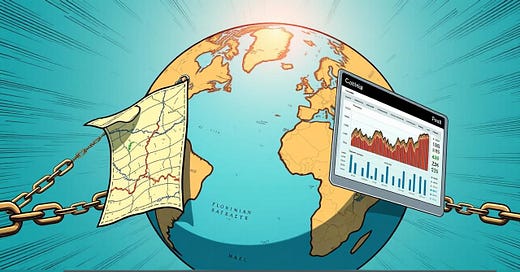The Conflicting Role of Colonialism in Today's Modern Economy
Dr Rubin interview segment on the role of colonialism in the world's rise of prosperity.
The complex legacy of colonialism continues to shape our understanding of economic development and global inequality. While the era of colonial empires has faded, its impact on institutions, culture, and economic trajectories was a key subject in "How the World Became Rich", co-authored by Dr. Jared Rubin. This topic was explored further during this interview segment with Dr. Rubin, where we discussed the intricate relationships between historical institutions and modern economic outcomes. To truly grasp the origins of consistent economic growth and the prospects for continued prosperity, we must examine colonialism within the broader context of world history and economic progress.
The Industrial Revolution marked the beginning of sustained economic growth, a phenomenon unprecedented in human history. Prior to this transformation, most of the world's population lived at or near subsistence levels, with per capita incomes rarely exceeding $1,500 in today's terms. The dramatic shift that followed has raised living standards globally, to the point where many former colonies now enjoy higher per capita incomes than the wealthiest nations of just two centuries ago.
However, the colonial experience has left an indelible mark on many regions, particularly in Africa. Research by economist Nathan Nunn reveals that areas most affected by the slave trade continue to struggle economically, even decades after independence. This persistence of poverty is linked to the erosion of trust within and between communities, a cultural legacy that continues to impede economic development.
The contrasting fates of former colonies highlight the complexity of colonial impact. Some, like the United States, Canada, and Australia, have become economic powerhouses. Others, particularly in sub-Saharan Africa, continue to grapple with poverty and institutional weakness. This divergence suggests that while colonialism was a significant factor in shaping economic destinies, it was not deterministic.
Today, as we assess the prospects for continued global prosperity, we must recognize both the progress made and the challenges that remain. Over 90% of the world's population now lives above subsistence level, a remarkable achievement in the span of human history. Yet, pockets of extreme poverty persist, often in regions where the negative impacts of colonialism were most profound.
The key to future progress lies in understanding and addressing the institutional and cultural factors that continue to influence economic outcomes. Good governance, robust institutions, and cultures of trust and cooperation are crucial for sustained economic growth. Nations that have successfully navigated the post-colonial era have often done so by adapting and improving upon the institutional frameworks left by colonial powers, while also fostering indigenous innovation and entrepreneurship.
As we look to the future, the legacy of colonialism serves as both a cautionary tale and a source of valuable lessons. It reminds us of the long-lasting impacts of historical injustices, while also highlighting the resilience of human societies in overcoming adversity. The path to continued prosperity requires a nuanced understanding of these historical forces, combined with a commitment to building inclusive institutions and fostering economic opportunities for all.
In conclusion, while the era of colonialism has passed, its echoes continue to resonate in the global economic landscape. By acknowledging this complex legacy and working to address its lingering effects, we can strive for a future of more equitable and sustainable prosperity for all nations.

